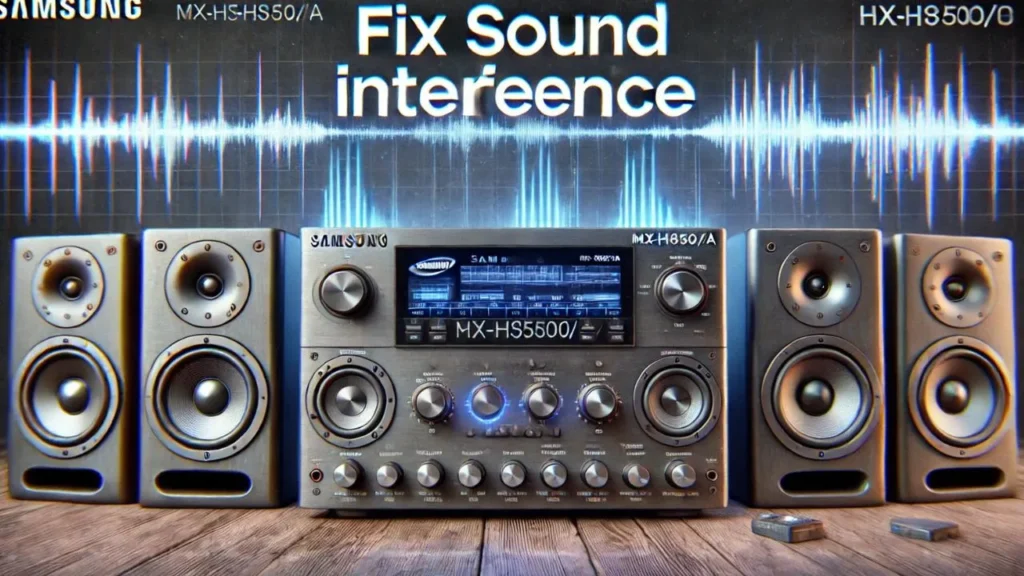The Samsung MX-hs8500/a Interferencia is a powerful home audio system known for its robust sound output and advanced features. However, like many electronic devices, it can occasionally experience interference problems that affect its performance. Whether you’re dealing with distorted sound, unexpected noise, or connectivity issues, interference can be frustrating.
In this article, we will review the causes of Samsung MX-hs8500/a Interference, provide troubleshooting, and share user experience to help you resolve these issues effectively. . With practical insights and tips, you’ll be able to improve your audio experience and enjoy seamless playback.
What is Interference in Audio Systems?
Interference in audio systems occurs when unwanted signals disrupt the normal operation of the system. These disruptions can result in various problems, such as buzzing sounds, loss of signal, or distortion in the audio. Interference can be caused by a range of factors, including electrical devices, wireless signals, or even environmental conditions.
The Samsung MX-hs8500/a Interferencia is a high-powered home audio system that works with multiple input and output channels. Like any sophisticated sound system, it is susceptible to interference from external sources. Understanding the types and causes of interference can help identify and resolve problems early.
Common Causes of Samsung MX-hs8500/a Interferencia
1. Electrical Interference
One of the most common causes of interference in audio systems is electrical interference. This occurs when the audio system comes into contact with other electronic devices that emit signals on the same frequency range. For example, appliances such as microwave ovens, routers, or fluorescent lights can cause interference with the Samsung MX-HS8500/A.
How to Detect Electrical Interference:
- If the interference happens only when certain appliances are in use, it’s likely that electrical interference is the issue.
- A noticeable buzzing or humming sound may accompany electrical interference.
2. Radio Frequency Interference (RFI)
Radio frequency interference is another common culprit, especially in urban areas where many wireless devices are in use. Devices such as cordless phones, Wi-Fi routers, and mobile phones emit RF signals that can affect the performance of your audio system.
How to Detect RFI:
- If your audio system picks up radio stations or you notice static noise, RFI could be to blame.
- Issues might occur intermittently, especially when devices like mobile phones are nearby.
3. Grounding Issues
Improper grounding of your audio system can cause interference. Ground loops occur when there is a difference in electrical potential between the components connected to your system. This causes unwanted noise, usually a low hum or buzz.
How to Detect Grounding Issues:
- Grounding issues often produce a consistent humming noise.
- Moving or disconnecting the system from other devices can momentarily reduce the noise.
4. Wireless Interference
The Samsung MX-HS8500/A is equipped with Bluetooth connectivity, allowing wireless streaming from various devices. However, this feature can sometimes cause interference if too many wireless devices are operating in the same area.
How to Detect Wireless Interference:
- If your system’s Bluetooth signal drops frequently or has issues maintaining a stable connection, you may be experiencing wireless interference.
- You might hear crackling or distorted sound during playback.
5. Physical Barriers and Obstacles
Physical objects between your audio system and connected devices (such as walls or furniture) can also cause interference. This is particularly relevant for wireless connections such as Bluetooth, where distance and obstacles can affect signal quality.
How to Detect Physical Barriers:
- If your audio quality improves when you bring the connected device closer or remove obstacles, then physical interference is the likely cause.
Common Causes of Interference and Solutions
| Cause of Interference | Symptoms | Solution |
| Electrical Interference | Buzzing or humming sound | Move system away from electrical devices |
| Radio Frequency Interference (RFI) | Static noise, picking up radio stations | Reposition system, use wired connections |
| Grounding Issues | Consistent humming noise | Ensure proper grounding, use ground loop isolator |
| Wireless Interference | Dropped Bluetooth connection, crackling sound | Turn off unused devices, reduce obstacles |
| Physical Barriers | Distorted sound, weak connection | Bring device closer, remove physical obstacles |
Troubleshooting Interference Issues with Samsung MX-hs8500/a Interferencia
1. Reposition Your Audio System
One of the simplest ways to reduce interference is by repositioning your Samsung MX-hs8500/a Interferencia. Keep it away from other electronic devices that could cause electrical or radio frequency interference. If you are using Bluetooth, ensure there are minimal physical barriers between your audio system and the connected device.
2. Switch to Wired Connections
Where possible, use a wired connection such as an AUX cable or optical cable rather than relying solely on Bluetooth. Wired connections are less prone to interference and offer a more stable audio experience.
3. Check the Grounding
Make sure your audio system and all connected devices are properly grounded. This can reduce the risk of ground loops, which are a common source of interference. If you suspect a grounding problem, using a ground loop isolator can help eliminate the noise.
4. Use a Power Conditioner
A power conditioner can help filter out electrical noise and provide a stable power supply to your system. This is especially useful in environments where multiple devices are connected to the same power source.
5. Reduce Wireless Interference
If you’re experiencing Bluetooth interference, try turning off other wireless devices in the area, or change the Wi-Fi channel on your router to minimize competition for bandwidth. If possible, bring the paired device closer to the audio system to improve the signal.
6. Update Firmware
Check for any firmware updates for the Samsung MX-hs8500/a Interferencia. Manufacturers often release updates to address known issues, including interference problems.
User Experience: Troubleshooting Interference
David’s Experience:
“I’ve been using the Samsung MX-hs8500/a Interferencia for over a year now, mostly for playing music during house parties. One weekend, I started noticing a faint buzzing noise in the background, even when the system was idle. At first, I thought it was just a small glitch, but the noise became more noticeable over time. I tried turning off all the nearby devices like my router and microwave, but it didn’t help much.
I reached out to Samsung support, and they suggested a few troubleshooting steps, including checking the grounding. I also moved the system to a different room, away from other electronics, and it made a significant difference. The buzzing noise reduced considerably. I also decided to switch from Bluetooth to a wired connection, and the sound quality improved. Overall, I learned that small changes in the setup could make a big difference in performance.”
Key Takeaways from David’s Experience:
- Grounding and positioning can greatly influence the audio system’s performance.
- Switching to wired connections can help eliminate wireless interference.
- Moving the system away from other electronic devices can reduce noise.
FAQs
1. Why is my Samsung MX-hs8500/a Interferencia producing a buzzing sound?
A buzzing sound is often caused by electrical interference or improper grounding. Check for nearby electronic devices that could be causing the issue and ensure that your system is properly grounded.
2. Can Bluetooth interference affect the sound quality of the Samsung MX-HS8500/A?
Yes, Bluetooth interference can lead to crackling sounds or dropped connections. To reduce Bluetooth interference, keep the connected device close to the audio system and minimize the number of wireless devices in the vicinity.
3. How can I stop my audio system from picking up radio signals?
If your audio system is picking up radio signals, it’s likely experiencing radio frequency interference. Try repositioning the system, switching to a wired connection, or using a power conditioner to reduce RFI.
4. How do I fix grounding issues in my audio system?
To fix grounding issues, ensure that all connected devices are properly grounded. If the problem persists, use a ground loop isolator to eliminate the noise caused by grounding problems.
5. What are the best ways to prevent interference in the Samsung MX-HS8500/A?
To prevent interference, ensure your system is positioned away from other electronic devices, use wired connections where possible, keep the system properly grounded, and reduce wireless interference by turning off unused devices or changing Wi-Fi channels.
Conclusion
Interference in audio systems like the Samsung MX-hs8500/a Interferencia can be frustrating, but it’s usually manageable with the right steps. By understanding the causes of interference—whether it’s electrical, radio frequency, or grounding issues—you can take effective measures to reduce or eliminate the problem.
Through practical troubleshooting tips, such as repositioning your system, using wired connections, and checking grounding, you can improve the performance of your audio system and enjoy clear, uninterrupted sound. Additionally, user experiences like David’s show that small changes in setup can make a big difference in reducing interference.







